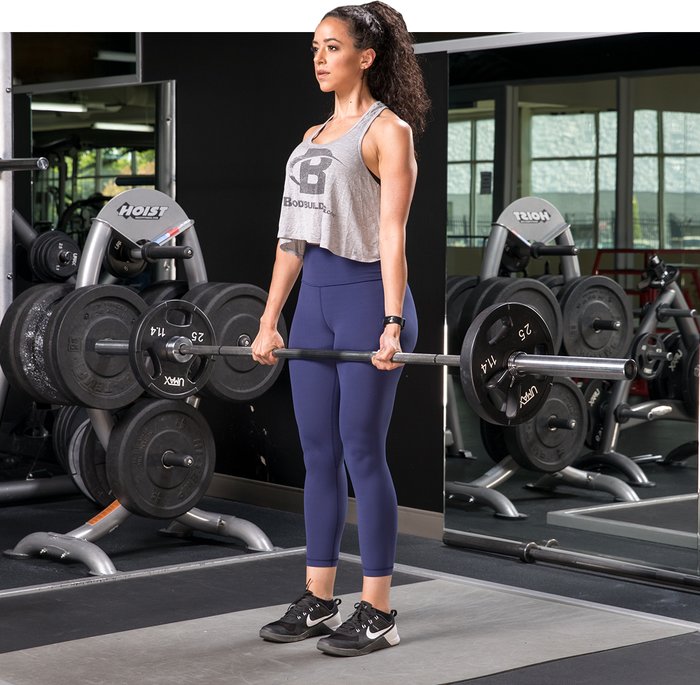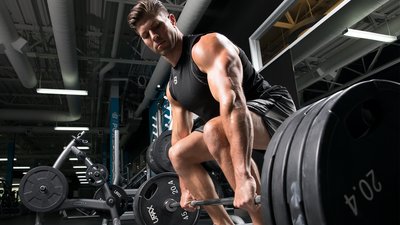It wasn't that long ago that I loaded 700 pounds on the barbell and prepared to quickly dismantle the deadlift. It was not to be: My grip gave out at knee level. My training partner, Paul Leonard, laughed and said, "You're finally strong enough to have a grip problem."
He was right. It's great to get stronger, but you've got to bring the rest of your body along with you. Lagging grip strength is the perfect case in point. If you continuously add muscle mass, your grip will eventually become the limiting factor, especially in your deadlift. When that happens, you can either be reactive and just try to hang every time you lift, or be proactive and fix your grip issue right now.

The thing about grip training is that it needs to be specific. Using training grippers will give you crushing strength for a firm handshake, but won't do diddly for your deadlift. To nail a deadlift competition, you've got to have crushing strength in at least one of these grips: the overhand grip, the hook grip, or the mixed grip, also known as the over-under grip.
The overhand hold is fine if you want to remain a novice, and the hook grip can work very well— especially if you have an Olympic lifting background. But since 95 percent of powerlifters use the mixed grip, I'm going to focus on five strategies that can turn your mixed grip into a vice.
1. Train How You Compete
First, there's no better way to build mixed grip-specific strength than by training that way without straps. Some lifters who consistently train this way may never need to do any other grip training besides that. Of course, there's a time and a place for straps, such as when you do overloads or high reps. If you want to build grip strength for a specific lift, though, you must train for that lift and not for grip strength in general. Simple as that.
2. Double Overhand Deadlift Holds
A client of mine, Steve Johnson, recently deadlifted an American-record 909 pounds raw. He trained for it by practicing holding 500 pounds with a double-overhand grip for 15 seconds. Performing this exercise is simple: Pick up a barbell with a double overhand grip—without straps—and hold it in the locked-out position for 15 seconds.
Do this for two sets, and aim for reaching a minimum of 60 percent of your one-rep max. Start light and add weight. For preemptive action, do this once a week. To correct an existing grip problem, do it twice a week for two sets, holding each set for 15 seconds.

3. Pinky Plate Farmer's Walks
I learned this exercise from my mentor, the legendary powerlifter Ed Coan, and it almost single-handedly solved my deadlift-grip-strength issue. It comes down to the little things: Often, when lifters miss a weight because of grip, you'll notice that their hands are open at the pinky.
The solution is to strengthen your pinky by grabbing a plate and pinching it between your thumb and your pinky, then holding it while you walk for 30 seconds. Start with 2-1/2 pounds and work your way up to a 10-pound plate. Do this for two sets once a week to stop a potential problem, or 2-3 times a week to correct an existing problem.
4. Ring Finger Plate Farmer's Walks
After the pinky pops off the bar during a heavy lift, the ring finger is usually the next to go. Go back to the exact same farmer's walk you did for the pinky, with the exact same guidelines, but this time hold the plate between your thumb and ring finger.
5. Supinated Holds
When the over-under grip fails, it's almost always the underhand grip that fails first, so you need to train your grip strength in a supinated position. Grab a lat pull-down machine bar with a supinated grip, pick up the weight with your arms totally extended, and hold this position for 15 seconds—without bending your arms. Do this for two sets. If you want to get ahead of the problem, do this once a week. Do it twice to correct existing grip issues.
For additional help, check out these other ways to improve your grip strength.



